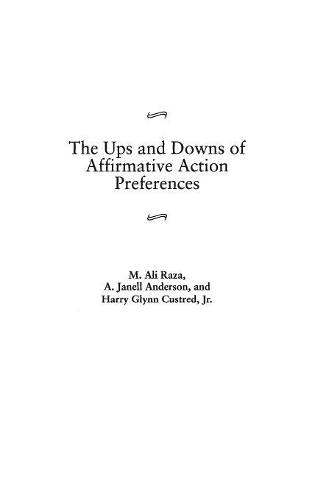
The Ups and Downs of Affirmative Action Preferences
(Hardback)
Publishing Details
The Ups and Downs of Affirmative Action Preferences
By (Author) M. Ali Raza
By (author) A. Janell Anderson
By (author) Harry Glynn Custred
Bloomsbury Publishing PLC
Praeger Publishers Inc
30th November 1999
United States
Classifications
Tertiary Education
Non Fiction
Social discrimination and social justice
Industrial relations, occupational health and safety
Commercial law
331.1330973
Physical Properties
Hardback
224
Description
In the context of the evolution of affirmative action at the national and state levels, this study offers an empirical account of the citizens' movement in California that successfully resulted in the passage of a constitutional amendment to abolish such preferences in public education, public employment, and public contracting. It describes how the concept of affirmative action was transmuted into quotas and set-asides even in those situations where there was no credible evidence of past discrimination. This process was aided by Presidential Executive Orders as well as by some Supreme Court decisions which, until the late 1980s, failed to provide clear parameters of compensatory versus preferential actions. The California movement arose to reassert the original vision of equality as contained in the Civil Rights Act of 1964. Raza, Anderson, and Custred, who have studied the historical development of the phenomenon and have witnessed its actual operation, lift the curtain of secrecy that surrounds such preferences. This book challenges the notion that affirmative action is a benign and temporary measure that simply provides a helping hand to those who are disadvantaged. There is ample evidence of the institutionalization of preferences that generally provide advantages to those who could otherwise compete on their own merits. Such unfair competitive advantages, provided by government agencies and public educational institutions have neither moral nor political majority support; however, they continue to exist through pressure of political interest groups, liberal political ideology, and entrenched bureaucrats who administer the system. Quite contrary to some people's thinking, the system of preferences may no longer be considered either permanent or necessary.
Reviews
Most appropriate for libraries collecting comprehensively on this topic, particularly at the research and professional levels.-Choice
"Most appropriate for libraries collecting comprehensively on this topic, particularly at the research and professional levels."-Choice
Author Bio
M. ALI RAZA teaches at the College of Business Administration at California State University, Sacramento. He served as a visiting Fulbright Professor at Vidyodaya University in Sri Lanka and as a senior adviser to the Government of Sri Lanka's United Nations' Development Program. A. JANELL ANDERSON a Political Scientist who teaches Business Law and Organizational Behavior at the College of Business Administration at California State University, Sacramento. She and M. Ali Raza coauthored Labor Relations and the Law (1996). She has published other works on government regulation of business. HARRY GLYNN CUSTRED, JR. is Professor of Anthropology at California State University, Hayward. His field is cultural and linguistic anthropology. He is coauthor and principal of California's Proposition 209 which ended racial, ethnic, and sex preferences in the public sector.
